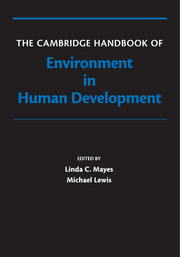Book contents
- The Cambridge Handbook of Environment in Human Development
- The Cambridge Handbook of Environment in Human Development
- Copyright page
- Contents
- Notes on Contributors
- The Role of Environments in Development:
- Part I The “Environmental” Variable
- Part II Contemporary Themes
- Part III Environments
- Part IV Measurement
- Chapter 26 Parenting Behavior as the Environment Where Children Grow
- Chapter 27 HOME Inventory
- Chapter 28 Measurement and Model Building in Studying the Influence of Socioeconomic Status on Child Development
- Chapter 29 Assessment of Parental Psychopathology and Adaptive Functioning
- Chapter 30 Assessment of Social Support, Social Network, and Social Capital
- Chapter 31 Stress Reactivity in Child Development Research
- Chapter 32 Mixed Model Analyses for Repeated-Measures Data
- Index
Chapter 31 - Stress Reactivity in Child Development Research
Indices, Correlates, and Future Directions
from Part IV - Measurement
Published online by Cambridge University Press: 05 October 2012
- The Cambridge Handbook of Environment in Human Development
- The Cambridge Handbook of Environment in Human Development
- Copyright page
- Contents
- Notes on Contributors
- The Role of Environments in Development:
- Part I The “Environmental” Variable
- Part II Contemporary Themes
- Part III Environments
- Part IV Measurement
- Chapter 26 Parenting Behavior as the Environment Where Children Grow
- Chapter 27 HOME Inventory
- Chapter 28 Measurement and Model Building in Studying the Influence of Socioeconomic Status on Child Development
- Chapter 29 Assessment of Parental Psychopathology and Adaptive Functioning
- Chapter 30 Assessment of Social Support, Social Network, and Social Capital
- Chapter 31 Stress Reactivity in Child Development Research
- Chapter 32 Mixed Model Analyses for Repeated-Measures Data
- Index
Summary
Information
- Type
- Chapter
- Information
- The Cambridge Handbook of Environment in Human Development , pp. 655 - 681Publisher: Cambridge University PressPrint publication year: 2012
Accessibility standard: Unknown
Why this information is here
This section outlines the accessibility features of this content - including support for screen readers, full keyboard navigation and high-contrast display options. This may not be relevant for you.Accessibility Information
- 6
- Cited by
